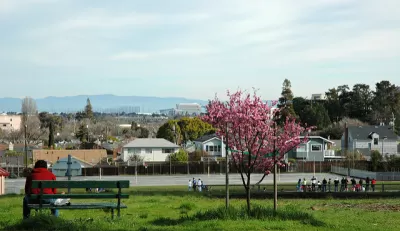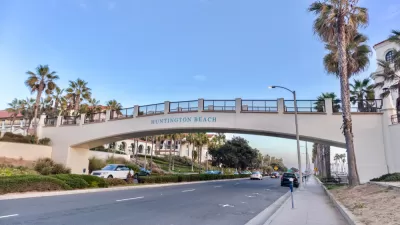After a San Mateo County Superior Court judge ruled that charter cities are exempt from the Housing Accountability Act, aka the anti-NIMBY law, the state stepped in to support the appellant, a YIMBY group that launched a "Sue the Suburbs" campaign.

The implications of a trial court judge's ruling on a lawsuit last November filed against a Bay Area city on the denial of a small multi-family residential development are far-reaching, explaining why Attorney General Xavier Becerra and Governor Gavin Newsom have intervened to support the California Renters Legal Advocacy and Education Fund (CarLA) in their appeal of San Francisco Bay Area Renters Federation v. City of San Mateo.
The ruling
At issue is whether state housing laws apply to all California cities or only general law cities. California Senate President pro Tempore Toni G. Atkins (D-San Diego) has also denounced the ruling.
In his Nov. 17 ruling, Superior Court Judge George Miram said, "the city of San Mateo was not obligated to follow a state law on housing approvals because it is a charter city — a system that gives local governments greater control over their own affairs," reports Alexei Koseff, state Capitol reporter for the San Francisco Chronicle, on Dec. 3.
According to the League of California Cities, there were 482 incorporated cities in California as of July 1, 2011:
- Number of charter cities: 121
- Number of general law cities: 361
While fewer in number, 58% of the state's population reside in charter cities, according to the attorney general's office.
The Bay Area Council, a powerful business group concerned about the region's housing shortage, took notice. "A terrible and misguided court decision in San Mateo County threatens to undo and undermine a raft of recent legislation aimed at easing California’s epic housing crisis, and hamstring the state in passing future housing reform legislation," states their post in response to the ruling.
The Bay Area Council in a letter sent to state Attorney General Xavier Becerra this week (Nov. 21) urges him to call for an immediate rehearing in the case.
Becerra did not intervene to ask for a rehearing, but on Jan. 14, in partnership with California Governor Gavin Newsom, he "announced filing to intervene in San Francisco Bay Area Renters Federation v. City of San Mateo to protect the state’s ability to address housing availability and affordability."
“The Housing Accountability Act is an important tool to address California’s housing supply challenges,” said Governor Newsom. “I have asked the Attorney General to intervene in this case to defend the validity of this important tool and its application throughout the state, including to charter cities. California will defend our ability to tackle the cost crisis by holding all cities accountable to statewide housing policy.”
The law
The Housing Accountability Act, a state law "originally enacted in 1982 in response to findings that inadequate access to housing is a critical problem that threatens economic, environmental, and social quality of life," states the AG's announcement. It "limits cities' ability to reject proposals for housing developments that otherwise satisfy general plan and zoning requirements."
The act was strengthened with the passage of Senate Bill 167, one of 15 housing bills signed by Gov. Jerry Brown in 2017, that ensures that "housing proposals that meet zoning and land use requirements can’t be arbitrarily denied," according to the author, Sen. Nancy Skinner (D-Berkeley).
The case
The ten-unit condo development is sited on the county's most heavily used bus transit line, zoned for multi-family, but adjacent to single-family homes, where homeowners complained about parking and height issues. The San Mateo Planning Commission determined it didn't comply with design guidelines and parking standards. The city council agreed in a 3-1 decision, "with Mayor Rick Bonilla voting against the denial," reported Anna Schuessler for the San Mateo Daily Journal on Feb 7, 2018 (see earlier post).
San Mateo maintains that as a charter city, they are exempt from some state housing laws, based on what San Mateo City Attorney Shawn Mason told Koseff of the Chronicle in the source article dated Jan. 14.
“Just as there are legal limits on the city’s authority, the California Constitution limits the state’s authority over Charter cities as well. We look forward to having our independent court system review this case.”
Sue the Suburbs
Managing editor James Brasuell posted last August on the litigious campaign by CarLA, a small but effective "501(c)3 that holds municipal governments accountable when acting in violation of California State laws." The San Mateo case is the first time, to this correspondent's knowledge, that CarLA have state government as an ally. See related posts (below) for CarLA's other lawsuits in the Bay Area.
Other laws and lawsuits
It's also not the first time that the governor and attorney general have taken aim at cities on enforcement of housing laws, and vice-versa, for that matter. Shortly after taking office a year ago, Newsom directed Becerra to sue the city of Huntington Beach in Orange County over another bill that his predecessor signed in 2017, Assembly Bill 72.
A week earlier, Huntington Beach had sued the state over another 2017 housing law, Senate Bill 35, on an issue that clearly parallels the city of San Mateo litigation as it claimed that charter cities were exempt from the controversial law that streamlines eligible housing developments.
Related in Planetizen:
-
Lawsuits: Not Just for Development Opponents Anymore, August 6, 2019
-
Putting Teeth into the California Housing Accountability Act, August 22, 2017
FULL STORY: California tries to save law it calls crucial tool in housing crisis

Planetizen Federal Action Tracker
A weekly monitor of how Trump’s orders and actions are impacting planners and planning in America.

Restaurant Patios Were a Pandemic Win — Why Were They so Hard to Keep?
Social distancing requirements and changes in travel patterns prompted cities to pilot new uses for street and sidewalk space. Then it got complicated.

Map: Where Senate Republicans Want to Sell Your Public Lands
For public land advocates, the Senate Republicans’ proposal to sell millions of acres of public land in the West is “the biggest fight of their careers.”

Maui's Vacation Rental Debate Turns Ugly
Verbal attacks, misinformation campaigns and fistfights plague a high-stakes debate to convert thousands of vacation rentals into long-term housing.

San Francisco Suspends Traffic Calming Amidst Record Deaths
Citing “a challenging fiscal landscape,” the city will cease the program on the heels of 42 traffic deaths, including 24 pedestrians.

California Homeless Arrests, Citations Spike After Ruling
An investigation reveals that anti-homeless actions increased up to 500% after Grants Pass v. Johnson — even in cities claiming no policy change.
Urban Design for Planners 1: Software Tools
This six-course series explores essential urban design concepts using open source software and equips planners with the tools they need to participate fully in the urban design process.
Planning for Universal Design
Learn the tools for implementing Universal Design in planning regulations.
Heyer Gruel & Associates PA
JM Goldson LLC
Custer County Colorado
City of Camden Redevelopment Agency
City of Astoria
Transportation Research & Education Center (TREC) at Portland State University
Camden Redevelopment Agency
City of Claremont
Municipality of Princeton (NJ)





























